 Petzlover
Petzlover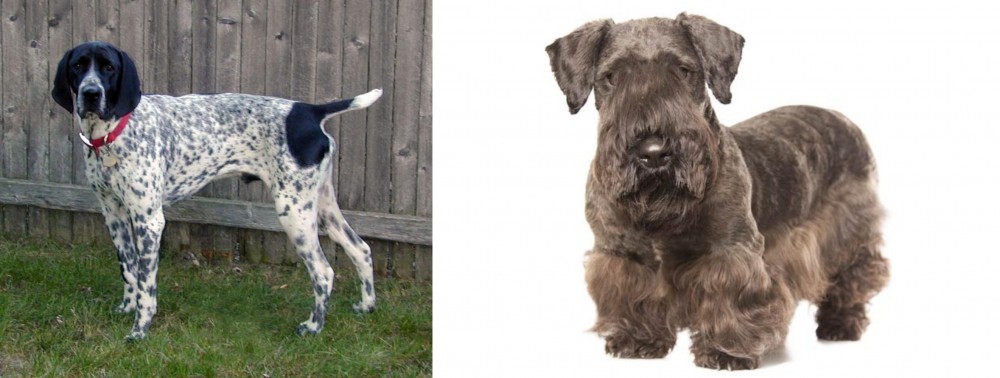 Braque d'Auvergne is originated from France but Cesky Terrier is originated from Czech Republic. Braque d'Auvergne may grow 38 cm / 15 inches higher than Cesky Terrier. Braque d'Auvergne may weigh 52 kg / 115 pounds more than Cesky Terrier. Both Braque d'Auvergne and Cesky Terrier has same life span. Braque d'Auvergne may have more litter size than Cesky Terrier. Braque d'Auvergne requires Low Maintenance. But Cesky Terrier requires Moderate Maintenance
Braque d'Auvergne is originated from France but Cesky Terrier is originated from Czech Republic. Braque d'Auvergne may grow 38 cm / 15 inches higher than Cesky Terrier. Braque d'Auvergne may weigh 52 kg / 115 pounds more than Cesky Terrier. Both Braque d'Auvergne and Cesky Terrier has same life span. Braque d'Auvergne may have more litter size than Cesky Terrier. Braque d'Auvergne requires Low Maintenance. But Cesky Terrier requires Moderate Maintenance
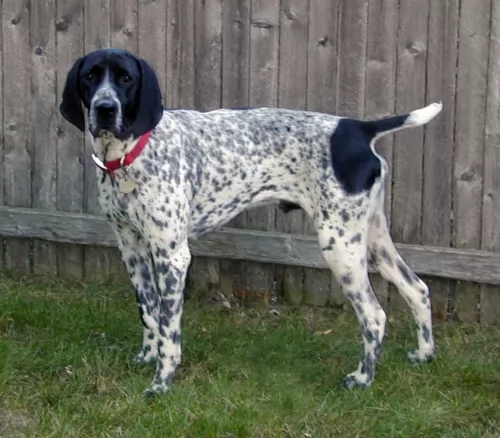 Sometime over 5 centuries ago, in the Cantal Region of France, was born a hunting breed, that might be the real ancestor of today’s pointing hunter dogs. Perhaps the oldest of all pointing gun dog is the Braque d’Auvergne. This breed comes from Central France in the region of Auvergne. This breed was developed prior to written dog breeding records in order to hunt in this region and find, point, flush out and retrieve fowl. This breed is clearly one of if not the oldest breeds in the French Braque. There is no agreement among historians on what breed is the oldest of the European pointing dogs and where they were developed – was it Spain or was it France? It is thought that the Braque Francais Gascogne is the original one of these in the early 1600’s while the Braque d’Auvergne came soon after. Due to the different hunting needs in the different parts of France, the Braque Francais Gascogne was crossed with a lot of other local scent hounds. The Braque d’Auvergne is one of the very oldest of all of these. There are records of the breeds existence in the 1700’s. It is probable that the Braque d’Auvergne was developed by crossing local dogs with Gascogne as well as with the Petit Bleu de Gascogne and the Grand Bleu de Gascogne.
Sometime over 5 centuries ago, in the Cantal Region of France, was born a hunting breed, that might be the real ancestor of today’s pointing hunter dogs. Perhaps the oldest of all pointing gun dog is the Braque d’Auvergne. This breed comes from Central France in the region of Auvergne. This breed was developed prior to written dog breeding records in order to hunt in this region and find, point, flush out and retrieve fowl. This breed is clearly one of if not the oldest breeds in the French Braque. There is no agreement among historians on what breed is the oldest of the European pointing dogs and where they were developed – was it Spain or was it France? It is thought that the Braque Francais Gascogne is the original one of these in the early 1600’s while the Braque d’Auvergne came soon after. Due to the different hunting needs in the different parts of France, the Braque Francais Gascogne was crossed with a lot of other local scent hounds. The Braque d’Auvergne is one of the very oldest of all of these. There are records of the breeds existence in the 1700’s. It is probable that the Braque d’Auvergne was developed by crossing local dogs with Gascogne as well as with the Petit Bleu de Gascogne and the Grand Bleu de Gascogne.
In all of Western Europe, the region of Auvergne is not very populated and has unique geography in that is hilly and has many extinct and eroded volcanoes. A lot of the region is still unpopulated. In this environment, wildlife has flourished, and hunting is successful in providing food for the regions people. This circumstance with an abundance of birds, led to the breeding of the Braque Auvergne to specialize in hunting in this area. The breed is not very popular outside of Auvergne and probably never was. That fact allowed them to be devastated by the Second World War. The Reunion des Amateurs de Braque d’Auvergne (RABA) was started to promote the pure breeding and the protection of the d’Auvergnes. But when Auvergnes was occupied during the war, the slowed breeding of the Braque d ‘ Auvergne almost eliminated the breed. There might have only been about 25 dogs left following the end of the war. These remaining dogs were used to revive the breed, but it is still uncommon, but not rare. Individuals have been imported by other countries including North America. The United Kennel Club (UKC) accepted the breed in 2006 but is not accepted by the AKC (American Kennel Club). The breed is still a working breed and outside of France, very rare.
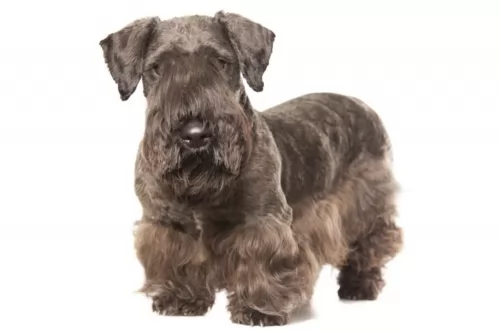 Known as the Bohemian Terrier and looking similar to a Scottish Terrier dog, the Cesky Terrier is a dog breed that has been created by Frantisek Horak, in the Czech Republic.
Known as the Bohemian Terrier and looking similar to a Scottish Terrier dog, the Cesky Terrier is a dog breed that has been created by Frantisek Horak, in the Czech Republic.
Horak wanted to breed a type of hunting dog, and in 1949, using both the Scottish Terrier ad the Sealyham Terrier, he bred the two, creating a new breed that would hopefully be a stronger hunting dog.
The Cesky Terrier was shown for the first time in 1959 and was recognized by the Federation Cynologique Internationale in 1963 and in 1993 by the United Kennel Club. It’s a rare dog this, and is the national dog of the Czech Republic.
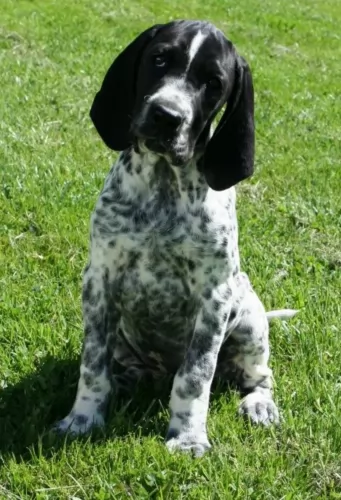 The Braque d’Auvergne is a well built, strong hunting dog with long ears, a large head and a docked tail. His coat is white with black markings and black ears and head. The breed looks a lot like all the other pointing dogs from France. They are medium in stature and has the appearance of a working gundog. He is athletic, muscular and fit. Docking the tail is outlawed in many countries and all of the United Kingdom. In that case the tail is high on the rump and always straight. Their face and head are big for the size of the body and shaped like an oval. With a long muzzle, deep set eyes and a gentle expression, they are kindly and handsome dogs. Their skin is loose but not droopy or wrinkled like hound dogs.
The Braque d’Auvergne is a well built, strong hunting dog with long ears, a large head and a docked tail. His coat is white with black markings and black ears and head. The breed looks a lot like all the other pointing dogs from France. They are medium in stature and has the appearance of a working gundog. He is athletic, muscular and fit. Docking the tail is outlawed in many countries and all of the United Kingdom. In that case the tail is high on the rump and always straight. Their face and head are big for the size of the body and shaped like an oval. With a long muzzle, deep set eyes and a gentle expression, they are kindly and handsome dogs. Their skin is loose but not droopy or wrinkled like hound dogs.
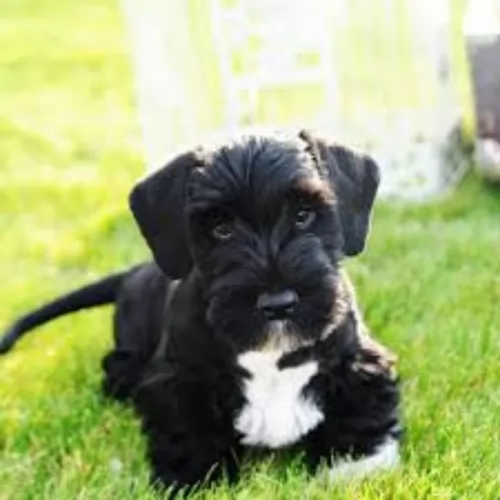 The Cesky Terrer is a longish dog, much like the Scottie and he also has short legs. He is roughly 29ck in height at the withers, is about 43cm in length and weighs anything from 5 to 10kg.
The Cesky Terrer is a longish dog, much like the Scottie and he also has short legs. He is roughly 29ck in height at the withers, is about 43cm in length and weighs anything from 5 to 10kg.
The coat of this dog is long, silky and quite wavy and can be in a number of different shades of gray or a light brown color. Puppies are born black. The soft coat can be kept groomed by clippers or you can take him to have his coat professionally trimmed.
This dog breed has natural drop ears, unlike the Scottie which has erect ears. The tail length is 18-20 cm and low set.
A loyal, quiet and loving family dog, the Cesky Terrier will get on well with children in the home and he is also friendly with other dogs. Just like with any other dog, it will be important to socialize the dog breed at an early age as then he becomes obedient, smart and relaxed. He is a breed which is also easy to train. He also makes a good watchdog.
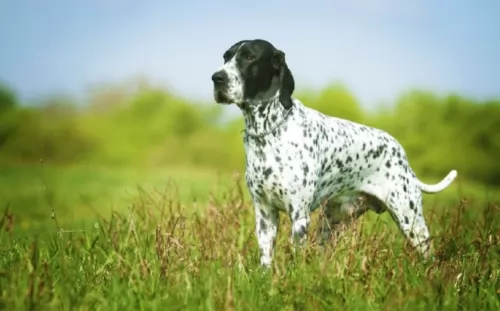 This is a gentle, adaptable and obedient breed. With their intelligence and affectionate nature, they make great family dogs and are eager to please their people. Living with other dogs is fine but not with small, prey size animals. The Braque d’Auvergne should never be left alone pets like gerbils and hamsters. They must be socialized to cats as pets and not prey before living with them successfully. They need to work closely with one human partner. They are first and foremost a hunting dog and need some sort of hunting simulation. They are devoted to their families and want to be constantly in their presence. This can lead to separation anxiety if they are left alone too much. They are great with children and need a family.
This is a gentle, adaptable and obedient breed. With their intelligence and affectionate nature, they make great family dogs and are eager to please their people. Living with other dogs is fine but not with small, prey size animals. The Braque d’Auvergne should never be left alone pets like gerbils and hamsters. They must be socialized to cats as pets and not prey before living with them successfully. They need to work closely with one human partner. They are first and foremost a hunting dog and need some sort of hunting simulation. They are devoted to their families and want to be constantly in their presence. This can lead to separation anxiety if they are left alone too much. They are great with children and need a family.
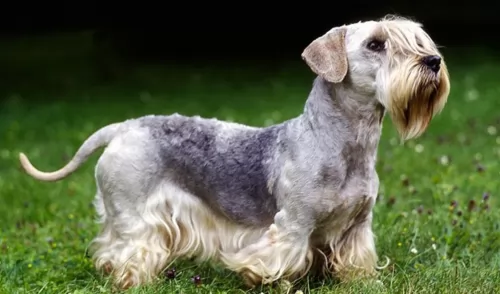 The Cesky Terrier isn’t a small-dog yapper and he will adapt to life in the city or the country. He is a small dog, but he is feisty and sporty and will willingly join you with your jogging or when you go on a walk.
The Cesky Terrier isn’t a small-dog yapper and he will adapt to life in the city or the country. He is a small dog, but he is feisty and sporty and will willingly join you with your jogging or when you go on a walk.
He is intelligent and playful and when you add in characteristics such as being courageous, loving, loyal and feisty, you can see that the Cesky Terrier is guaranteed to make a super family pet.
 The Braque d’Auvergne is a healthy breed but can face some of the same health concerns as other pointers and hunting dogs. The long, droopy ears can get infected easily if wet and need to be cleaned regularly so that food or dirt are not trapped their either. Because of the small gene pool however they may be at risk for several issues. The breeders in France express concerns about possible hip dysplasia and testing is highly recommended. Because they are at risk for other conditions that might not show up until later in life, it is also recommended that they be tested by the Canine Eye Registration Foundation (CERF) as well as the Orthopedic Foundation for Animals (OFA).
The Braque d’Auvergne is a healthy breed but can face some of the same health concerns as other pointers and hunting dogs. The long, droopy ears can get infected easily if wet and need to be cleaned regularly so that food or dirt are not trapped their either. Because of the small gene pool however they may be at risk for several issues. The breeders in France express concerns about possible hip dysplasia and testing is highly recommended. Because they are at risk for other conditions that might not show up until later in life, it is also recommended that they be tested by the Canine Eye Registration Foundation (CERF) as well as the Orthopedic Foundation for Animals (OFA).
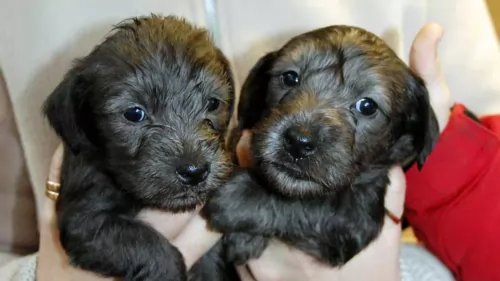 The Cesky Terrier is generally a healthy dog, but this breed sometimes suffers from common dog ailments that other breeds also have to contend with.
The Cesky Terrier is generally a healthy dog, but this breed sometimes suffers from common dog ailments that other breeds also have to contend with.
Eye disorders, ear infections, pancreatitis, hip dysplasia and weight gain are just some health issues you might need to be aware of.
Remember that if you want to promote a healthier dog, feeding him a quality diet and taking him immediately to the vet when you suspect a problem can keep him free from common dog illnesses.
Pancreatitis for instances develops when the pancreas becomes inflamed, and this can be brought on by allowing your pet to become obese. There are other reasons for pancreatitis too such as infection. You will see diarrhea, fever and vomiting with your pet as well as discomfort from abdominal pain. It’s a disease which affects smaller dogs more often than larger breeds.
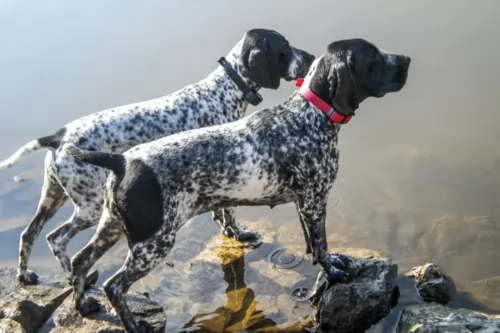 The Braque d’Auvergne needs a high-quality diet fit for a working dog but not too much to make him obese. They are an active breed to choose a formula that is designed for working dogs.
The Braque d’Auvergne needs a high-quality diet fit for a working dog but not too much to make him obese. They are an active breed to choose a formula that is designed for working dogs.
Although no studies have been conducted on the Braque d’Auvergne’s health issues there are many conditions that similar breeds are susceptible to and the d’Auvergne might be as well. This includes any of the following:
This is an active, working dog who needs a lot of stimulation and exercise. The only real appropriate exercise for these dogs is hunting or outings in the woods. He not only needs the exercise, but he also needs to stimulate his sense of smell and his gundog intelligence. He might excel in lure chase or even a form or barn hunt. They certainly could excel at obedience trials and perhaps rally. If you are a weekend hunter then this is the ideal dog for you. They are so easy to train that they surpass other pointers for success with casual hunters. They hunt at a slower pace than many other gundogs. Their intelligence and athleticism lend itself well to agility and flyball also. They need a large (+acres)fenced in area to run and play.
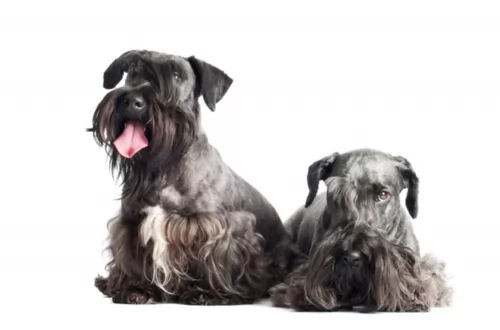 Cesky Terriers may well be a little bit less active and quieter than other terriers, but they will still need a good dose of exercise. He loves to dig, and if he is bored and doesn’t have a plenty of exercise and games, he will want to dig more and cause the owner a lot of frustration. Take him for daily walks and give him some ball games in the garden.
Cesky Terriers may well be a little bit less active and quieter than other terriers, but they will still need a good dose of exercise. He loves to dig, and if he is bored and doesn’t have a plenty of exercise and games, he will want to dig more and cause the owner a lot of frustration. Take him for daily walks and give him some ball games in the garden.
Cesky Terriers will need brushing down at least twice a week and their coats will need to be trimmed into shape every 8 to 10 weeks or so. You’ll also need to check excess hair inside the ears.
As with any dog breed, you will need to check on his nails so that they don’t grow too long and also brush his teeth 2 or 3 times a week to avoid dental disease.